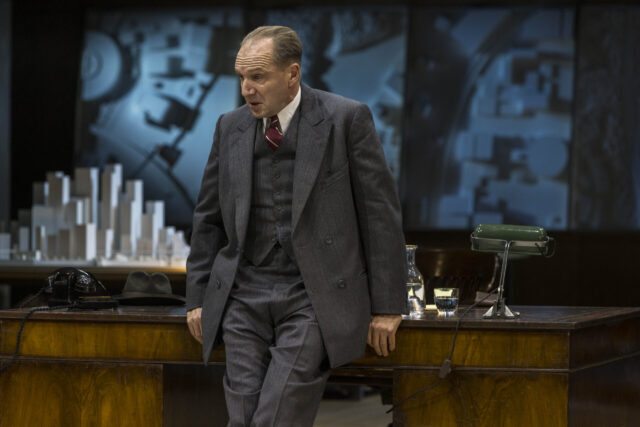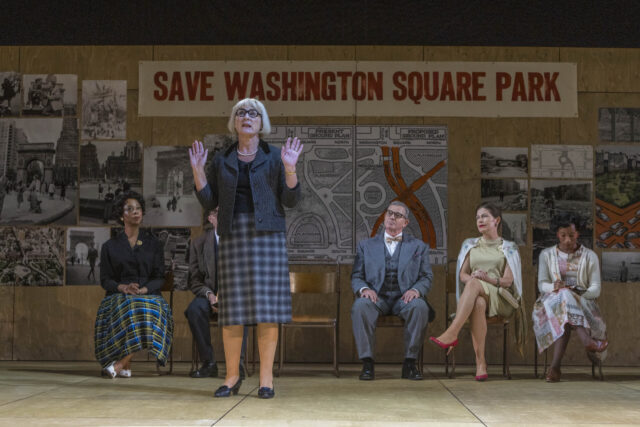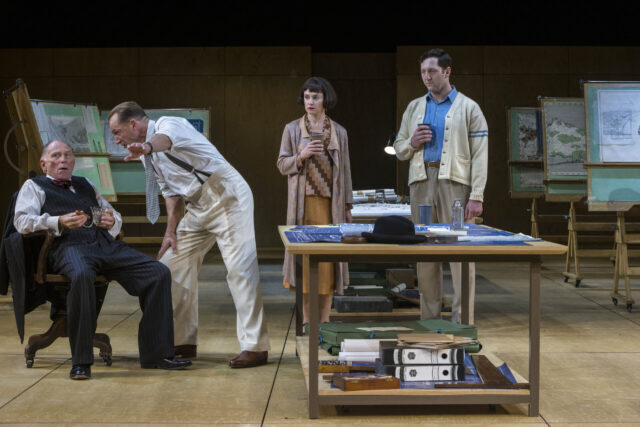
Ralph Fiennes as Robert Moses in David Hare’s Straight Line Crazy (photo by Kate Glicksberg)
STRAIGHT LINE CRAZY
The Griffin Theater at the Shed
The Bloomberg Building at Hudson Yards
545 West 30th St. at Eleventh Ave.
Tuesday – Sunday through December 18
646-455-3494
theshed.org
David Hare’s sparkling, intense Straight Line Crazy, which opened Wednesday night at the Shed’s Griffin Theater, begins with Ralph Fiennes walking down Bob Crowley’s T-shaped stage, barefoot and wearing a suit. He does not need to introduce his character to the New York City audience; he is portraying infamous urban planner Robert Moses. Before he can say anything, the sold-out crowd erupts in entrance applause for the two-time Oscar and Emmy nominee and Tony winner. In a brief monologue, Moses says, explaining his penchant for swimming, “The further I swim the happier I am. At night, best of all. So how do I feel when people say ‘We were worried. You were gone so long. We called the coast guard.’ How do I feel? I tell them, ‘Why did you panic? Nothing’s going to happen to me.’”
A moment later, Helen Schlesinger, in frumpy attire — Crowley also designed the costumes — approaches, announcing, “I’m Jane Jacobs.” The audience again bursts into applause, but it’s not for the British television and theater actress as much as for her character, a woman whose name is instantly familiar to so many New Yorkers as Moses’s longtime archnemesis even though, as she points out, they never met. Explaining her original lack of interest in architecture, she states about her change of mind, “What made me think about architecture was that moment when I realized I was going to die. I remember thinking, what will be left of us? After we’re gone? And I remember reading that only two things remain. Cities and songs.”
Straight Line Crazy begins in 1926, as Moses, the chairman of the New York State Council of Parks (and later secretary of state and Parks and Recreation commissioner), is hard at work developing plans for the building of the Southern State and Northern State Parkways on Long Island. He sees the automobile as the future and is determined to bring access to Jones Beach to the masses, despite strong pushback from such wealthy landowners as the Morgans, the Whitneys, and the Fricks.

Jane Jacobs (Helen Schlesinger) won’t give up the fight against Robert Moses in Straight Line Crazy (photo by Kate Glicksberg)
“Every summer those few adventurous souls who dare to head this way are brought to a halt, as their overheated engines expire on badly maintained tracks,” Moses tells Henry Vanderbilt (Guy Paul). “Everything possible is done to discourage them. Well, no longer. My new parkways will make travelling as attractive as arriving.” Vanderbilt promises “impassioned and intransigent opposition to all your plans . . . unified, organized, and unyielding.” But there’s nothing Moses enjoys more than a good fight. When Vanderbilt calls him a revolutionary, Moses responds, “To the contrary. The very opposite. My aim is to forestall revolution, not to incite it.” However, his revolution is strictly for cars; he adamantly refuses to include any form of public transportation, no buses or trains.
Moses is a bold, severe man, unwilling to accept that he’s ever wrong, unable to consider compromises or concessions of any kind, unafraid of brazenly skirting the law. He speaks in aphorisms whether discussing plans with the two main members of his team, the fictional duo of Finnuala Connell (Judith Roddy) and Ariel Porter (Adam Silver), or the rambunctious, cigar-chomping New York governor, Al Smith (Danny Webb). “I made the mistake of thinking that if I proposed something which was logical, reasonable, and effective, people would at once see its merits and fall in behind it. . . . They blocked it at every turn,” Moses tells Porter. He says to Connell, “I’m a ditchdigger, I’m not an academic. I put academia behind me. It’s for the young. It’s for the inadequate. . . . The people lack imagination. The job of the leader is to provide it.”
In a swirling, exciting conversation with Smith, Moses explains, “I never ask favors. I ask my due.” On his way out, Smith tells Porter and Connell, “Hard to leave a meeting with Moses without feeling you’ve been robbed. But just as hard to know what the fuck you’ve been robbed of.”
Meanwhile, in the background, Jacobs starts making her case against Moses. “If you think fighting power is fun, I’d advise you to think again,” she says to the audience. The second act moves to 1955, as Jacobs is leading the battle against Moses’s plan to run a sunken highway right through the middle of Washington Square Park. While he claims it is to liberate traffic and offer a desperately needed throughfare into Lower Manhattan, Jacobs, along with fellow activists Shirley Hayes (Alana Maria), Sandy McQuade (Al Coppola), Carole Ames (Krysten Peck), Nicole Savage (Mary Stillwaggon Stewart), and Lewis Mason (Andrew Lewis), are arguing against the project.

Robert Moses (Ralph Fiennes) lets Gov. Al Smith (Danny Webb) know what’s on his mind in Straight Line Crazy (photo by Kate Glicksberg)
Also expressing her displeasure is one of Moses’s newest employees, Mariah Heller (Alisha Bailey), a Black architect with dreams of supporting the public good while harboring nightmares about how Moses’s destruction of the South Bronx negatively impacted her family. “You’re no different from anyone else, Mr. Moses,” she says to him. “Sometimes you’re right and sometimes you’re wrong. And in this particular instance, you’re handling things wrong.” Heller represents all the people of color who were seemingly cast aside by Moses through five decades of racist and classist public planning, as brought to light in Robert Caro’s seminal biography, The Power Broker, and by other historians.
But after all that time, Moses is as intransigent as ever. With Porter and Connell still at his side, Moses is even more cold and distant, ultimately a lonely, ill-tempered man whose reputation — for achievements that include Jones Beach, Lincoln Center, the West Side Highway, the United Nations, the state park system, and the Robert Moses Causeway — has been torn down by the wrecking ball of time, faster than it was built.
Directors Nicholas Hytner (Miss Saigon, The History Boys) and Jamie Armitage (Six, Southern Belles) manage to keep things interesting despite several stagnant scenes with lots of sitting and standing around as characters explicate and speechify. George Fenton’s original music, which is thankfully not used very often, is faint and distracting, complicating George Dennis’s sound design.
Webb (King Lear, Pennyworth) injects much-needed electricity as Smith, who is willing to go toe-to-toe with Moses, swilling bourbon, chomping on a stogie, and loudly pontificating on his relationship with the people of New York. You practically get swept up by the wind swirling around him as he marches across the stage.
Silver (Masters of the Air, Sons of the Prophet) and Roddy (Translations, Knives in Hens) are solid as two longtime Moses employees who understand their boss all too well and have remained loyal despite his failure to see them as individuals with lives outside the office. There’s not much Bailey can do in the thankless, anachronistic role of Heller, who openly calls Moses out on his racist tactics; her character seems forced, included primarily as a way for Hare (Plenty, Skylight) to address Moses’s biases.
Fiennes (Schindler’s List, The English Patient), who previously played architect Halvard Solness in Hare’s adaptation of Henrik Ibsen’s The Master Builder and teamed with Hare and Hytner in Hare’s coronavirus play, Beat the Devil, is dazzling as Moses, a larger-than-life figure played by one of the greatest actors of his generation. Fiennes’s previous stage appearances in New York City came on Broadway in 1995 in Hamlet, at BAM in 2000 in Coriolanus and Richard II, and back on Broadway in 2006 in Brian Friel’s Faith Healer, all as the title character. When he stands atop an enormous layout of New York on the floor, a man bigger than the city itself, you can the sovereignty that is surging inside him is palpable.
Fiennes’s turn as the iconoclastic Moses was greatly anticipated here: The show’s entire run sold out and resale tickets are available online for between $800 and $1800. It is a giant of a performance; Fiennes, who played Lord Voldemort in the Harry Potter films, commands the stage with a powerful authority and determination that matches that of Moses himself, although he is much more generous with the actors surrounding him than Moses was to his supporting cast.
It is also fitting that the show, a London Theatre production, takes place at the Shed, the entertainment venue at Hudson Yards, home to a chic, high-end mall and a tourist-attraction sculpture (the Vessel) with a sad history of attracting suicides, next to the West Side train lot, the High Line, and the Javits Center, where buses compete with car traffic. I think not even Moses would know what to make of it all.